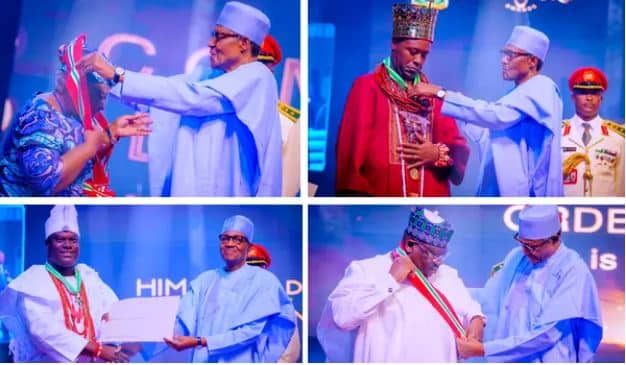News
Experts, Others Carpet National Assembly As Buhari Plans $4bn, €710m Borrowings
Loans will reduce poverty – President
The President, Major General Muhammadu Buhari (retd.), has asked the National Assembly to approve fresh external loans of $4.05bn and €710m for his regime.
The Publisher Nigeria learnt that Experts and Civil Society Organizations who spoke to our correspondents faulted the process of approving loans for the current regime by the National Assembly.
Buhari is also seeking the nation’s legislature’s approval for grant components of $125m in the 2018-2020 external rolling borrowing plan.
These were contained in a letter addressed to both chambers of the National Assembly and read on the floor at the resumption of plenary by the presiding officers Messrs Ahmad Lawan and Femi Gbajabiamila (Senate President and Speaker of House of Representatives respectively) on Tuesday.
Buhari had on May 18, 2021sought the approval of the Senate to borrow $6.18bn external loan to finance this year’s N5.6trn budget deficit.
He had said the proposed loan, which is equivalent of N2.3tn would be used to finance the 2021 budget deficit of N5.6tn.
Also, the Federal Executive Council, on July 8, 2021 approved the 2022 – 2024 Medium Term Expenditure Framework and the Fiscal Strategy Paper, authorising the funding of the N5.26tn deficit envisaged in the 2022 budget through borrowings.
Buhari in the latest letter, dated 24th August, 2021, explained that the projects listed in the 2018-2021 Federal Government Borrowing Plan would be financed through sovereign loans from the World Bank.
Other sources according to him are the French Development Agency, China-Exim Bank, International Fund for Agricultural Development, Credit Suisse Group and Standard Chattered/China Export and Credit.
He explained that the amount would be used to fund federal and state governments projects cut across key sectors such as infrastructure, health, agriculture and food security, energy, education and Human Capital Development and COVID-19 response efforts.
The president added that the projects were spread across the six geopolitical zones of the country.
He said they would bring about employment generation and poverty reduction, as well as protection of the most vulnerable and very poor segments of the Nigerian society.
Part of the letter read, “I write on the above subject and submit the attached addendum to the proposed 2018-2020 external rolling borrowing plan for the consideration and concurrent approval of the senate for the same to become effective.
“The distinguished Senate President may recall that I submitted a request on 2018-2020 borrowing plan for the approval of the senate in May 2021.
“However, in view of other emerging needs and to ensure that all critical projects approved by Federal Executive Council as of June 2021 are incorporated, I hereby forward an addendum to the proposed borrowing plan.
“The projects listed in the external borrowing plan are to be financed through sovereign loans from the World Bank, French Development Agency, EXIM Bank and IFAD in the total sum of $4,054,476,863 and €710m and grant components of $125m.
“A summary of some key projects in each of the six geopolitical zones and a summary on the expected impacts on the socioeconomic development of each of the six geopolitical zones are attached herewith as Annex II and III.”
Experts ask lawmakers to do due diligence on loans
Senior lecturer in economics at the Pan Atlantic University, Olalekan Aworinde, said the speed at which the legislative body grants approval to the loan requests made by the executive arm created an impression that requests were not properly vetted.
He advised that the NASS should evaluate the efficacy of existing loans and their sustainability before granting approvals for new ones.
“The national assembly needs to look at existing loans: how have the existing loans been applied; have they been used for the purposes they were earmarked for or the purposes the government claimed they were for.
“What is the level of implementation of the projects the government said the loans were being acquired for. They are supposed to know these before they approve another loan.”
Another expert and a professor of economics at the Olabisi Onabanjo University, Ogun State, Sheriffdeen Tella, said the actions of the legislature with regards to external loans approval were unbecoming.
He said that the NASS had a duty to not only evaluate the impacts of the loans acquired by the executive but also pay attention to public opinion.
Dr Muda Yusuf, an economist and private sector advocate, said that the processes of approving loan requests made by the presidency in the National Assembly are largely political.
He said for the National Assembly to ensure due diligence, the legislators need to have a deeper and non-partisan conversation on the issue of sustainability of the country’s debt.
“The processes are largely political,” he said, adding, “They should have a deeper and nonpartisan conversation on the issue of sustainability of the country’s debt.”



